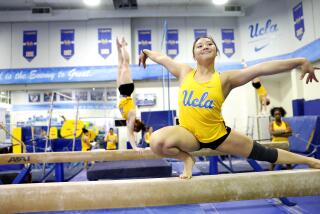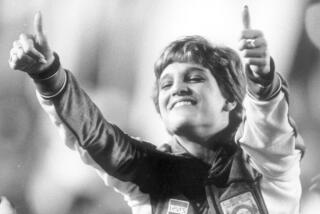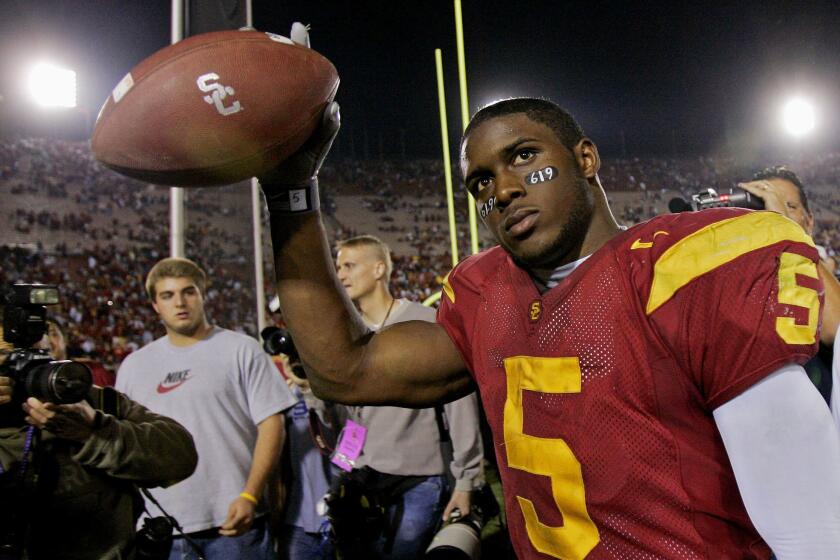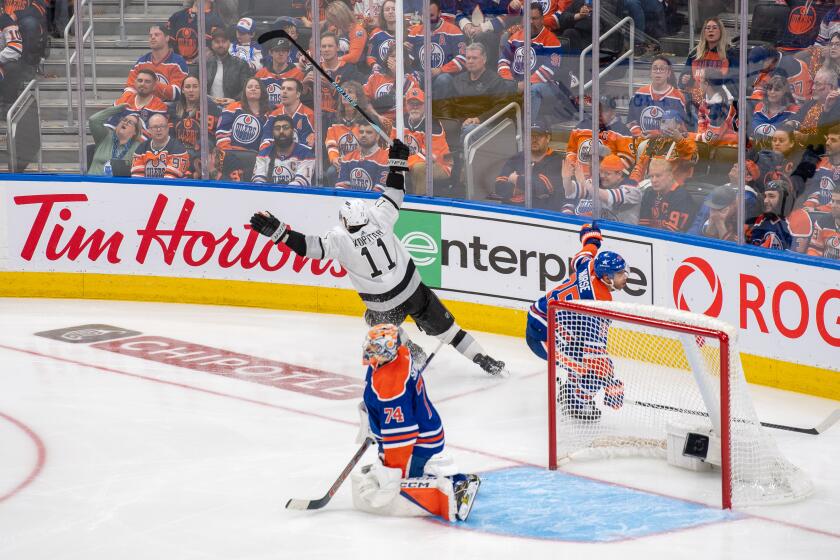For some, Olympic dreams are ringed by pain, sacrifice
Every family has its daily rituals.
Loretta Butler’s involves dragging a lawn chair onto the yellowed grass in the backyard of her Gardena home and watching daughter Patricia climb into a blue-gray plastic trash can filled with water and 28 pounds of ice.
“For 15 minutes every day we just sit and talk about nothing,” she says. “There’s nothing that means more than that to me.”
It’s a good thing she values the visits because Butler, an unemployed waitress, has been paying as much as $600 a week for the privilege.
The afternoon ice baths are part of a therapy regimen for daughter Patricia Manuel, an aspiring Olympic boxer who is running out of time to rehab injuries to a foot, wrist and her right shoulder. To help, her family is paying for high-end physical therapists and two doctors — a medical Dream Team of sorts that also includes a strength and conditioning trainer and a boxing coach.
For the family’s modest bank account, it’s been a Drain Team. Yet no one’s complaining.
“What we want is the best for her,” says Manuel’s grandmother, Patricia Jean Butler, who is also paying some of the bill even though she’s retired from her job as assistant director of the Loyola law library. “The best we can get, we’ll get it. One way or another, we’ll get it.”
In that way Manuel and her family are not alone. Few world-class athletes have ever made it to top of their sport without pushing their bodies — and many times those bodies push back.
“Every elite athlete fights injury at some point in their career,” says Dotsie Bausch, an aspiring first-time Olympian in track cycling. “And how they deal with the adversity is what makes them a champion.”
Like Manuel, Bausch has chosen physical therapy over surgery to manage an injury that threatens to derail her chances of competing in next summer’s London Games. In her case, it’s a bulging disk in her lower back.
But unlike Manuel, Bausch is a professional so her medical support system hasn’t cost her — or her family — a penny. Doug Thralls, the massage therapist who has treated her as often as three times a week for the last two years, works for both USA Cycling and the OUCH cycling team. The team is headed by Dr. Brent Kay, a national record-setting rider who co-owns the Temecula sports medicine clinic were Thralls works.
That’s a huge advantage, both in the quality of care Bausch receives and the stress she avoids.
“I am going to the Olympics, God willing and if I stay healthy. Staying healthy and injury free is an Olympian’s biggest obstacle,” says Bausch, who, at 38, will be the oldest member of the U.S. cycling team in London. “Every person in the world — athlete or not — can understand how hard it is to exercise if they are in pain. But being in pain and doing it at an Olympic level is really mentally draining sometimes.”
Thralls, soft-spoken and frequently smiling, is amiable and humble to a fault. But among cyclists, triathletes and tennis players his reputation borders on legendary. And in Bausch’s case, he’s been able to treat her back pain without going anywhere near the bulging disk.
“It’s a domino effect. These low muscles get out of whack or they spasm, get tight, everything compensates for it,” Thralls says. “It’s like your car being a little bit out of alignment. You can drive around town but if you get on the freeway and push 80 mph you’re going to blow it up. We sort of untangle that stress each time we’re on the table.
“After a while, it’s not a low-back question anymore.”
Thralls says elite athletes are constantly treading the fine line separating the necessary stresses of training from the potentially crippling effects of pushing their bodies too far. That can be especially true for an athlete such as Bausch, a former New York fashion model who punished her body before, having survived a near-fatal eating disorder and a cocaine habit before taking up cycling in her mid-20s.
“It’s hard to interpret whether it’s a pain to go through, a suffering-training load, or an injury-producing load,” Thralls says. “Everyone, when you do exercise, kind of gets a little bit of stress and a little bit of training benefit as long as they recover from the stress.
“So when we’re doing massage, the big effect [is] they can take on, they can digest more training in a given amount of time.”
Recently Bausch began supplementing Thralls’ work by wearing SpiderTech, an over-the-counter brand of kinesiology tape she says aids in injury prevention and pain management. Tennis player Li Na wore the same tape on her injured knee when she won the French Open in June.
“It’s been such a big part of my therapy regimen,” says Bausch, who makes a 130-mile round trip from her Irvine home to Thralls’ office, hidden in a spacious strip mall off I-15. “It . . . helps so much with pain relief instead of popping pills. I was taking up to eight Advil a day and now I take none.”
The fact that Manuel’s family has to sacrifice to provide Patricia with the kind of physical therapy Bausch gets for free is a product of an Olympic system guided by Byzantine rules and regulations.
In the 1980s, the International Olympic Committee rubbed away the line separating professional and amateur sports, opening the Games to all competitors who met the eligibility requirements adopted by the international governing body for their sports. Those requirements vary widely, however, with sports such as basketball, tennis and cycling welcoming professionals while the International Amateur Boxing Assn. bans athletes who have participated in prizefights.
That has resulted in a wildly uneven playing field that has made things tough for the likes of Manuel, a dynamic fighter with a powerful right hand and an aggressive style that has proven as painful to her as it has to her opponents.
“I push myself too hard,” she says. “The same traits that make me a good athlete are also my downside. I’m really stubborn and I will push myself to the brink. I tend to injure myself and keep going.”
Since she began boxing nine years ago, Manuel estimates she has invested thousands of hours in her sport while her family — including two uncles, Jim and T.J. — have invested tens of thousands of dollars in doctor’s visits, therapy and travel. (Her father is no longer part of her life, she said.)
“Me and my family have to pay for everything,” says Manuel, 25, who lives with her bulldog in a studio apartment in Long Beach, working odd hours as a fitness trainer and a security guard when her training allows. “My family and I are definitely making an effort. I’m sure that there’s things that they’re sacrificing so that I’m able to do this.
“I hope I can get to the point where I can pay them all back for all this, at least in some way. But this has to be done. It’s such a small time frame. None of us want to look back and be like, ‘We could have done this, we could have done that.’”
Manuel, who collects tattoos (she has 10) along with national boxing titles (she has four), hasn’t fought since March because of a compressed joint in her right shoulder. It’s an injury that has required aggressive therapy to get her ready for a Police Athletic League tournament in October in Toledo, Ohio, where she must finish no worse than second to qualify for next year’s Olympic trials.
If she fails, it will be four years — and likely tens of thousands in medical bills — before she gets another shot.
“It just drives me harder and harder,” Manuel says.
She fights at 132 pounds, the middle of three weight classifications adopted for the first Olympic boxing competition for women.
“We’ve all come so far in the past seven months. It’s just one more step,” she said. “One more step to the trials. One more step to the worlds. One more step to the Olympics. One more step to the gold. To me, it just keeps propelling me further and further to where we need to go.”
Sitting at the dining room table in her house at the end of a cul-de-sac of wood-and-stucco homes and concrete-block walls, Loretta Butler waves away the thought of sacrifice. Her living room is furnished with nothing more than a recliner and a mattress pushed into a corner. And she can’t remember the last time she took a decent vacation.
She is hoping to go to London next summer for the Olympics. And if that doesn’t happen, she can always look forward to those 15 minutes in the backyard with her daughter and an ice-cold trash can.
“There’s no material possession that means more to me,” Butler says of Manuel. “I tell people all the time I aspire to be like her. I don’t know how I got so lucky to have such amazing children.
“She never, ever complains. It’s an honor to be with her. So I don’t view it as I’m missing out on anything. I feel sorry for people who don’t have the opportunity.”
More to Read
Get our high school sports newsletter
Prep Rally is devoted to the SoCal high school sports experience, bringing you scores, stories and a behind-the-scenes look at what makes prep sports so popular.
You may occasionally receive promotional content from the Los Angeles Times.







